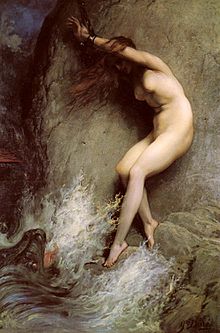Andromeda (Euripides)
| Andromeda | |
|---|---|

Andromeda exposed to the sea-monster (1869) Gustave Doré.
|
|
| Written by | Euripides |
| Chorus | Parthenoi, virgin women |
| Characters |
Andromeda Perseus Echo Messenger Cepheus? Athena? Others? |
| Date premiered | 412 BC |
| Place premiered | Athens |
| Original language | Ancient Greek |
| Genre | Tragedy |
Andromeda (Ancient Greek: Ἀνδρομέδα, Androméda) is a lost tragedy written by Euripides, based on the myth of Andromeda and first produced in 412 BC, in a trilogy that also included Euripides' Helen. Andromeda may have been the first depiction on stage of a young man falling in love with a woman. The play has been lost; however, a number of fragments are extant. In addition, a number of ancient sources refer to the play, including several references in plays by Aristophanes.
Several aspects of the plot of Andromeda can be inferred from the extant fragments and references. The play opened with Andromeda alone on stage, having been chained to a rock near the sea and near a cave by her father Cepheus, King of Aethiopia, to be eaten by a sea monster. This was to mollify the sea god Poseidon after either Cepheus or his wife Cassiopeia had offended the god. Andromeda laments her fate alone, with only her echo to respond. A chorus of virgins (parthenoi) appears as Andromeda's lament continues. Then Perseus appears, using the crane to depict his flight on winged sandals, "planting my foot on high, cutting a path through the midst of the ether," having just defeated the Gorgon Medusa. Upon appearing, Perseus believes Andromeda is a statue and remarks "Hold—what promontory do I see here, lapped by sea foam, and what maiden's likeness, a statue carved by an expert hand to her very form in stone?" When Perseus asks Andromeda if she will show his gratitude if he saves her, she responds "Take me, stranger, whether for servant, wife, or slave." During their dialogue, Perseus apparently moved from being struck by Andromeda's beauty to feeling pity for her to falling in love with her. This may have been the first depiction of a man falling in love with a woman on stage. In fragment 136, Perseus famously demands of Eros to "either don't teach us to see beauty in what is beautiful, or help those who are in love to succeed in their efforts as they suffer the toils that you yourself have crafted," stating further that if Eros does so he will "be honored by mortals" but if not those in love will no longer give Eros their gratitude. A messenger delivered the news that Perseus had successfully defeated the sea monster.
...
Wikipedia
